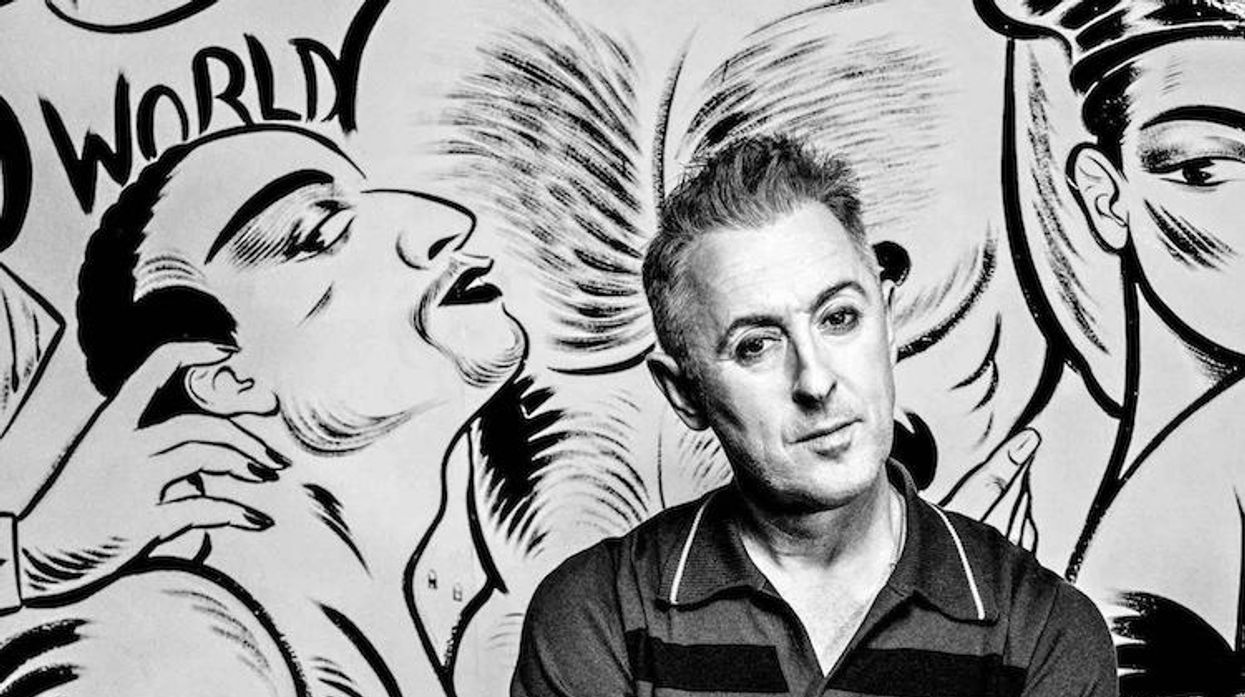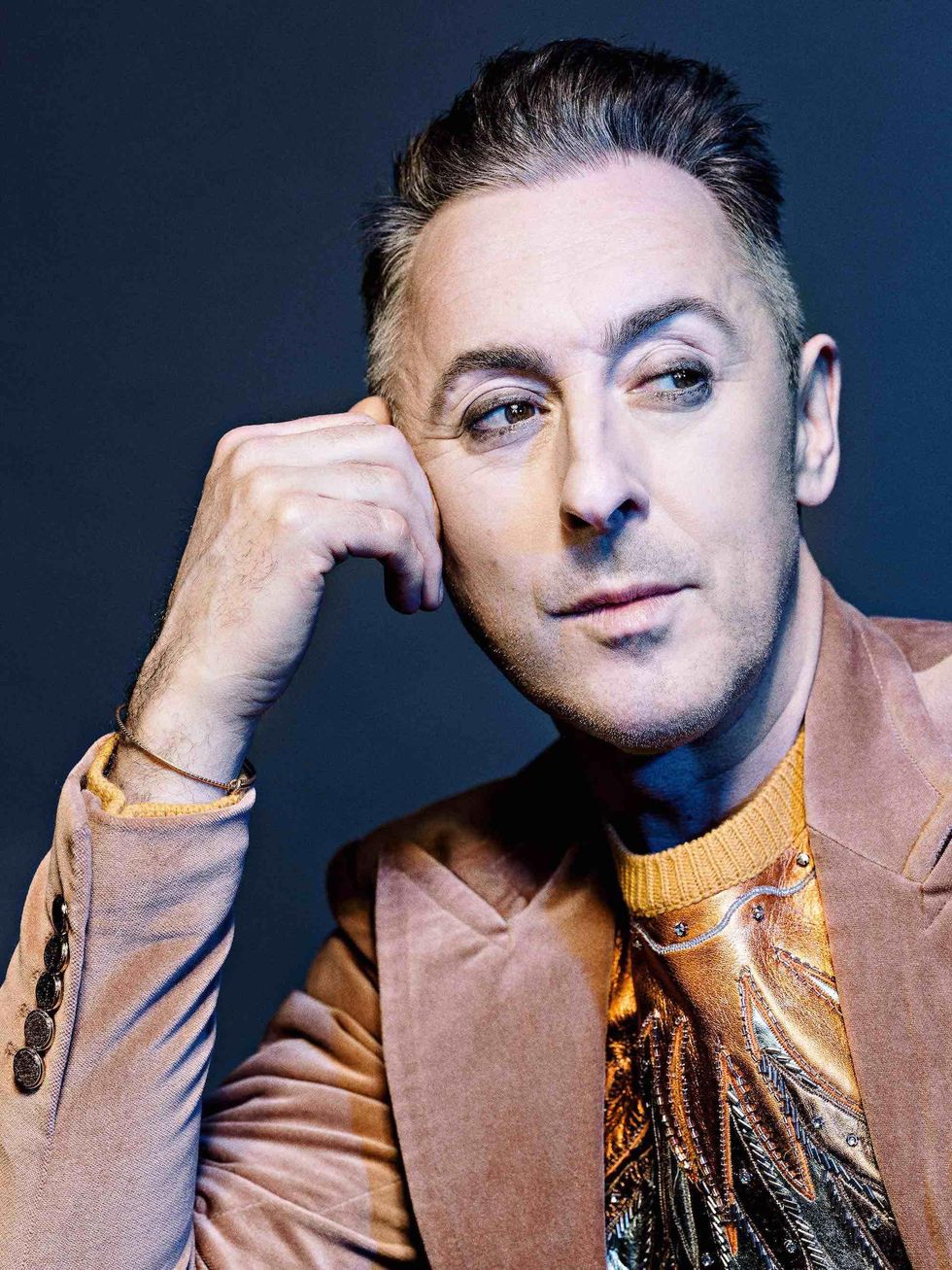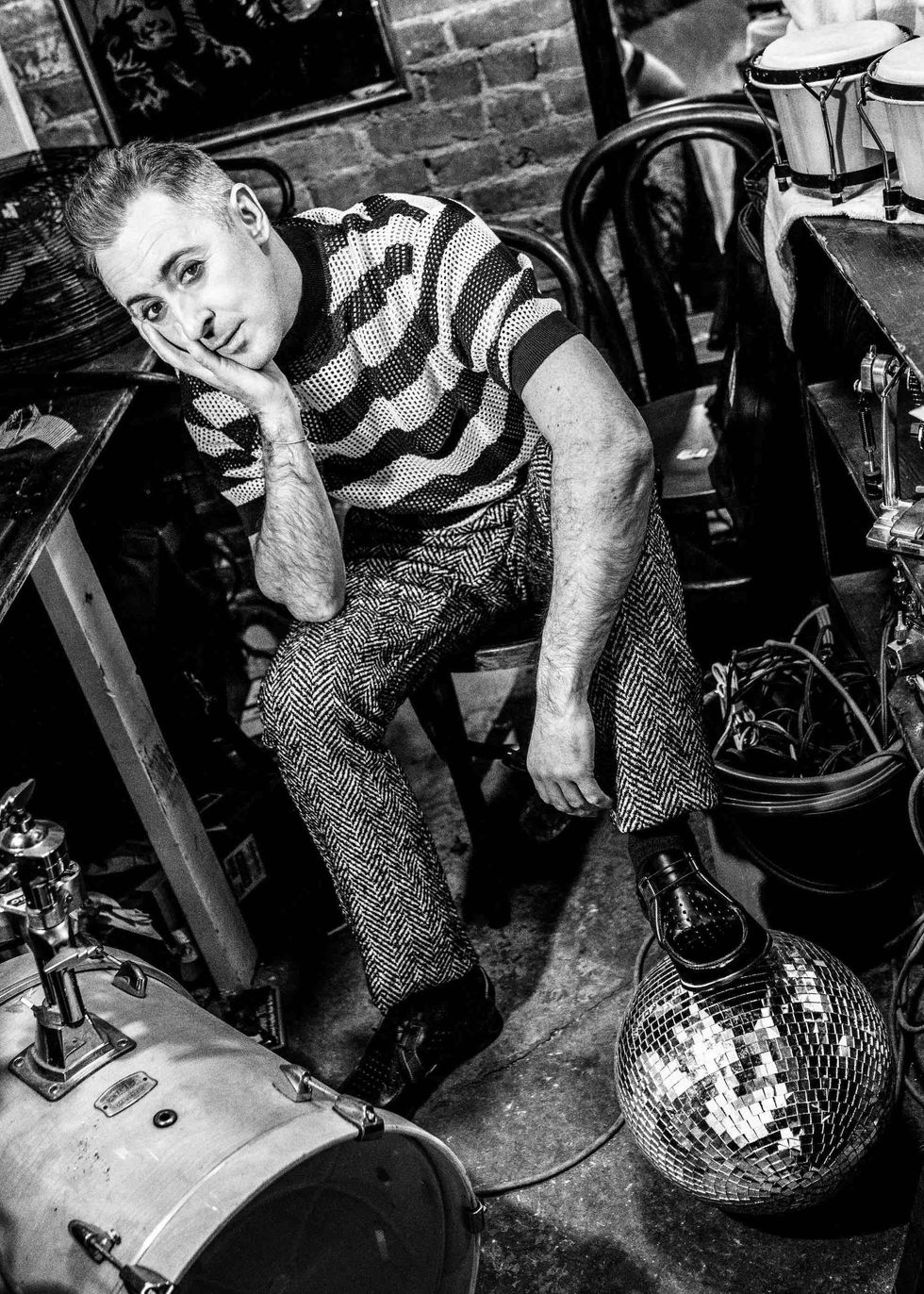Alan Cumming did not coin the pithy truism "Mean people suck." But it is something of a guiding sentiment for the actor, who grew up so tormented by his abusive father that he confessed in his autobiography to having no memories of childhood that were "not clouded by fear or humiliation or pain." Maybe that's why he's so determined that no one feels excluded or marginalized at his buzzy new cabaret-themed bar, Club Cumming, in New York's East Village. "We've got zero tolerance for meanness," he says. "We don't want mean, and we don't create an outlet for it."
Case in point: A night before our meeting, Cumming had thrown a 20th anniversary screening of Spice World that included a costume contest--the kind of arena in which you might expect to run into a deluge of shade. Not on Cumming's watch. "The first boy got up and he was dressed as Baby Spice," he recalls. "And he said something mean about another Baby Spice onstage, so I said, 'Excuse me, you're going to have to leave now--you've not met the level of kindness that is expected here. You're out of the competition.' "
Related | Alan Cumming Says Young Queer Men Don't Care About the AIDS Crisis
Cumming has discovered over time that in matters of public etiquette it's always best to be, as he calls it, "blunt with kindness." Should you run into him walking his dog Lala one morning, do not be offended if he turns down your gracious request for a selfie. "I had this epiphany," he says. "I don't have to take my photo with everybody who asks. When you're literally picking up your dog's poop and someone asks, 'Can I have a photo?,' and I say, 'I have shit in my hands, I'm not going to take a photo,' and they go, 'Oh, once you put it in the bin can I have a photo?' I will still say 'No.' " He is bemused by our compulsive need to capture every moment on Instagram, as if no experience is authentic without digital evidence that it happened. At his celebrated solo shows--he follows up Alan Cumming Sings Sappy Songs with Legal Immigrant at New York's ritzy Cafe Carlyle in June--he wants his audience to live in the moment, and not be distracted by their efforts to record the performances for posterity.
"I love the connection you get with the audience," he says. "There's nothing like it. It's even more than the connection you get in a play or a musical." A tattoo on his arm is a famous quote from E.M. Forster's Howards End: "Only connect." Sometimes he'll take the phone from someone in the audience and delete what they've been recording, because for him that's not connection. "Of course you are going to record me and take a photo when I'm doing a concert," he says. "But don't be sitting a meter away from me, holding your arm like that..." He mimes a camera in his face. "Be discreet."
This can make Cumming sound like a scold, but it's really just a well-honed instinct for directness. Anyone who has spent time in his native Scotland will recognize the candor. A spade is a spade is a spade, after all. If you want to insist it's a fork, move to Hollywood. Cumming does a great impression of an agent tying themselves in knots to make rejection sound like a positive. "When you don't get a job they'll say, 'They changed direction, they don't have a handle on the part.'" He recalls being on the cusp of getting a role in a sci-fi movie. "I said, 'Oh, that sounds fun.' " But when he followed up a few weeks later he was told the part had gone to Judi Dench. "That bitch is always getting my roles," he jokes, before launching into a story of trying to escape showbiz by checking into an English health farm, only to run into Maggie Smith and Emma Thompson, with Kate Winslet apparently en route. "We were all in our robes at breakfast, and Dame Maggie came up to me and sort of loomed in and went"--here he adopts a menacing tone--"enjoy your stay."
Jacket and sweater by Gucci.
Stories like this--bon mots, really--punctuate the conversation with delightful regularity. Cumming lacks the internal censor that can often turn celebrity interviews into a snoozefest of excessive caution. When we get to the topic, as inevitably we must, of the #MeToo movement that is roiling his industry, his eyes widen in horror and awe. "Do you think Gayle King ever saw Charlie Rose naked?" he asks, a subtle twitch at the corners of his mouth, a gentle arch in his generous eyebrows. "I've been on Charlie Rose a couple of times, and the idea of me sitting in the green room and him walking in naked is just so insane to me. Why has it taken so long for it to be a problem?"
Cumming's question is serious, but also rhetorical. Hans Christian Andersen wrote an entire fairy tale about the dynamics of power, "The Emperor's New Clothes." In the entertainment industry, a lot of emperors have been exposed as unalloyed predators, and the revelations keep on coming. "People are going, 'Oh, it's too much now,' " says Cumming. "But it should be too much--you should be sickened by how awful and endemic it is."
We've yet to see what #MeToo will mean for diversity, but Cumming's new CBS show, Instinct, could be a harbinger of what's to come. Based on the popular thrillers of James Patterson, the prime-time series, which premieres March 18, stars Cumming as Dr. Dylan Reinhart, a gay criminal psychologist solving crimes alongside a female NYPD detective (Bojana Novakovic) in a New York City run by an Indian female mayor (Sarita Choudhury). With the added bonus of Whoopi Goldberg as Reinhart's literary agent, Instinct has a cast that begins to look like the city it represents. For the most part, straight white guys are either the murderers, or their victims. "We're like the diversity show," says Cumming, although he stops short of slapping CBS on the back for its progressiveness. "The idea that it's a risk in 2018 to have, for the first time ever, a gay lead on a network drama is ridiculous," he says. "The fact that millions of people who've never seen a same-sex couple portrayed anywhere are going to see it in the middle of a cop show is how you change things."
We're in a bar just around the corner from Club Cumming, and it's tempting to see his new venture as nightclub emcee as a nod to the project that first brought Cumming to New York in 1998: co-starring with Natasha Richardson in the Roundabout Theatre revival of Cabaret. Rarely has a Broadway show so quickly cemented a performer's career as Sam Mendes's production did for Cumming. "I was this semi-clad, sexy pixie that was kind of sexually ambiguous and European and weird," he recalls. "I think that kind of incited feelings in people that they normally wouldn't have when seeing a Broadway show." The performance won him a Tony, and the roles that followed in Cabaret's wake largely played on his impish personality, from a comic villain, Fegan Floop, in the wonderfully loopy Spy Kids franchise, to Nightcrawler--a teleporting mutant--in X-Men 2, and Gutsy Smurf in The Smurfs. Evidently, European, weird, and sexually ambiguous was fertile ground for Cumming.
And then came The Good Wife, still among the hardest-working network shows of all time. Loosely inspired by the real-life figure of Eliot Spitzer, the New York attorney general forced out of office by a sex scandal in March 2008, it followed the career of a disgraced politician's wife, Alicia Florrick, as she rebuilt her life starting from the bottom rung of a Chicago law firm. In a pleasing example of casting against type, Cumming played a straight, dyspeptic political fixer. "Even I was like, 'What, you're casting me?' " he remembers. "I had never really played a human being before, much less a middle-aged man in a suit." Complex, morally questionable, and casually cynical, The Good Wife brilliantly mirrored the political and social currents of the time. Cumming was quickly elevated to a series regular and earned two Emmy nominations for his work.
Instinct has more in common with another iconic CBS procedural, the long-running Murder, She Wrote, with a touch of Agatha Christie's Poirot thrown in. Almost all murder mysteries rely on implausible scenarios and unlikely coincidences, and Instinct is not about to buck the trend. Its strength lies in taking the tropes of the classic murder mystery and reframing them around an atypical sleuthing duo: a woman whose principal love interest is her dog, and a gay man with a penchant for sweater vests. Cumming is enjoying figuring out Reinhart's psyche.
Shirt, pants and shoes by Prada.
"There are so many different traits to this character--it's been really fascinating making him all one person, while at the same time solving mysteries and stepping over dead bodies," he says. He's not oblivious to the show's capacity for camp. "So far, I've saved Bojana from a burning building; I've run down the steps of a courthouse with her in my arms; I've persuaded a man not to blow up the Brooklyn Bridge; I've tackled a serial killer; and I've disabled a lady who was going to attack me with a sickle in a barn." He also saves Whoopi's life by shooting a glass of poisoned iced tea out of her hand. Nothing far-fetched there.
Cumming clearly had a good time making Instinct, but the project he's had the deepest attachment to is After Louie, a small independent movie. A festival circuit favorite (it will have a short run in New York starting March 30), the film explores the schism between older gay men who survived the depths of the AIDS epidemic and millennials for whom that's just blurry history. Cumming stars as Sam--loosely based on the film's director Vincent Gagliostro--who is struggling to make a movie about the death of a friend when he meets Zachary Booth's Braeden. It's in the complexities of their relationship that the gulf between two generations of gay men is explored and resolved. Only connect, to quote Forster.
Connection, or its absence at least, is in many ways the theme of Not My Father's Son, Cumming's deeply affecting 2014 memoir in which he sets out to make sense of his fractured relationship with his father. Writing it was a cathartic experience that has since brought Cumming back into contact with people from his childhood. At an event at the Cheltenham Literature Festival in England, a former teacher was in the audience. "He recalled giving me a ride home after some concert, and me asking to get out early and walk the rest of the way," says Cumming. "The truth was that I just didn't want him to see my house." Other encounters, like reuniting with his former scoutmaster, have been happier. "He gave me the running order of a concert we'd done, and it was always 'Alan at the piano.' He remembered me being so appalled by the standard of musicality." He laughs. "I was about 10."
Shirt by Hermes.
Cumming is a naturalized United States citizen today, largely so that he can vote, but spends time in Scotland when he can, often in support of the independence movement. "I'm an outsider here, but I'm also an outsider in Scotland, and I quite like that," he says. "I'm intrigued by that idea -- being an outsider is a really good place to get a perspective on things."
Despite his brutish upbringing, he is both passionate and proud of his roots, and credits Scotland's free education system for getting him to where he is today. "My mum and dad would never have been able to afford to pay my way through drama school," he says. "I earned my acting chops in subsidized theater, and when that's your experience you don't fully appreciate it, and then you come here." He muses for a second on what his life might have been without the opportunities a free education provided. "The fact that I could go to drama school and not bankrupt my parents by doing so, and then make a living -- it starts with that."
There is one particularly vivid scene in Not My Father's Son, in which a 13-year-old Cumming buys a dinner service from a junk stand at an agricultural show in Arbroath, home to Scotland's famous smoked kippers. The day is cold and damp, as it often is there, and his father has disappeared with a woman he has accidentally-on-purpose run into. Alone, shivering in the mist, Cumming makes a bid for a crockery set. It has "beige and bland '70s-style flowers printed on every plate, bowl, and cup," but to the young boy it represents escape. "I would be eating off them in a place where there were buses and taxis and where I would never have to wait in a public place for hours, cold and damp, wondering if my father had concluded his liaison."
Miraculously, that dinner service, or pieces of it, survived for many years, until Cumming moved to New York, where the promise it had long represented was well and truly met.
Feature image: Shirt and pants by Hermes. Shoes by Church's.
Photography by Benedict Evans
Styling by Michael Cook
































